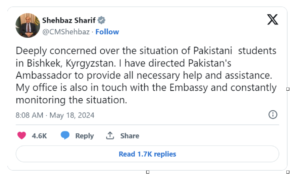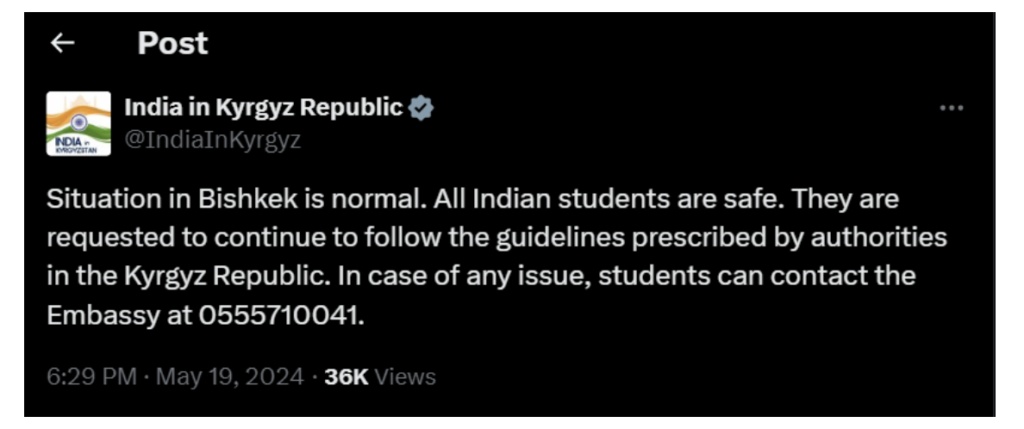Kyrgyzstan – A country known for its stunning landscape and rich nomadic culture. Many foreign students, especially from India, Pakistan and Bangladesh, go there for affordable medical education. They seek high-quality training in the field. However, a recent incident of violence against these students has caused alarm in Bishkek. Further, we will explore some serious questions related to the recent Bishkek attack on students. Let’s begin with some burning questions first.
Attacks on foreign students in Kyrgyzstan – Timelines
- May 13, 2024: It all began with a scuffle between local people and foreign students; included in this mix were Pakistanis and Egyptians living in a dormitory. The scuffle was videoed and posted in such a way that it went viral all-over social media, sparking anger and indignation among the locals.
- May 16, 2024: Everything just got worse as the mobs turned their attention to international students. In the targeting of the students’ hostels, mainly those from Bangladesh, Pakistan and India, many got injured.
- May 17, 2024: The escalated violence reached its peak, with intensified attacks. This saw locals take to the streets in an uproar against the apparently privileged status of foreign students who had minor involvement in the original altercation. These calls soon escalated into violent confrontations, with demands for tough measures against foreign students.
What Happened on the Night of May 17?
On May 17, Korish Malik a Pakistani medical student received a warning to stay indoors. A large crowd of locals over 700 people,surrounded the VIP Hostel housing 800 international students.
- Bilal Ishaq, another Pakistani student saw the crowd moving and alerted others.
- Police arrived but lacked riot gear. Students were told to switch off lights, lock doors, and barricade themselves.
- The mob entered through an emergency exit smashing windows and doors. Videos showed stones thrown and glass shattering. Korish and his roommates hid for six to eight hours. The aftermath was clear: damage and terror.
International Reaction on Attacks on foreigners in Kyrgyzstan
The embassies of India and Pakistan in Bishkek advised students to stay indoors. Pakistan Prime Minister Shehbaz Sharif updated his status on X early on the morning of May 18. He said, “Deeply concerned about the situation of Pakistani students in Bishkek.”

The Indian Embassy in Kyrgyzstan immediately reassured Indian students that they were safe. They asked students to follow guidelines given by the local administration. They also urged students to stay in regular touch with the officials at the embassy.

The Indian embassy in Kyrgyzstan issued a press release on Wednesday. It stated that Kyrgyz authorities have taken quick measures to restore normalcy in Bishkek. Normalcy has been restored with immediate effect. There have been no new incidents in the past couple of days. However, classes are still being held online as a safety measure. The embassy has also told the Indian students that they should approach the universities for the formalities related to the exams before they return to India. Presently, in Kyrgyzstan, there are an estimated 17,000-odd Indian students, with the majority of them located in the capital city, Bishkek. The Indian Embassy in Kyrgyzstan is in coordination with the universities and government offices to help students. The embassy also gave the contact helpline numbers of 0555710041 and 0555005538 to help, which are active 24 hours daily. It urged students and families to pay no attention to rumors.
Pakistanis and Indians students in Kyrgyzstan
Presently, more than 11,000 students from Pakistan and 15,000 from India are doing medical degree programs in Kyrgyzstan. The students come to study because of the high standards maintained in former Soviet medical colleges and the low tuition fees there compared to those in the West and in their home countries. Medical colleges in Kyrgyzstan are also attracting students from Arab and African countries. Ishaq, a student from Faisalabad, said a medical degree in Pakistan could cost nearly eight to nine million rupees ($28,000 to $32,000), while in Kyrgyzstan it costs four to five million rupees ($14,000 to $18,000). “It was more feasible to study here. But now, with the Pakistani currency devaluation, costs are increasing. With the rate of 160 per U.S. dollar, gradual devaluation started and today it stands at 278 rupees a dollar.
Past instances of violence between local residents and foreign students in Kyrgyzstan
Tensions between local residents and foreign students in Kyrgyzstan, particularly those from Pakistan, are not new. These tensions often stem from cultural misunderstandings and perceived preferential treatment. In 2019, there were reports of grave clashes with locals and Pakistani students. Small problems turned out to be massive confrontations due to normal cultural misinterpretations and misconceptions of misbehaviour.
Misunderstandings: Host populations from time to time, perceived Pakistani students as having less regard for their local customs and traditions. Incidents of loud gatherings and public behaviour those considered disrespectful were common points of contention.
Perceptions of preferential treatment: Other sources of tension include natives’ feelings that foreign students, especially from Pakistan, are given preferential treatment: with better living facilities, less stringent academic expectations, and with more resources dedicated to foreign students at the expense of the natives.
Students life in Kyrgyzstan
International students in Kyrgyzstan typically live in university dormitories or rent private accommodations. These students bring diverse cultures and traditions, enriching the local environment but also facing integration challenges.
- Accommodation: Dormitory costs range from $500 to $1,000 per year. Private rentals can be between $200 to $500 per month.
- Cultural Exchange: Universities often organize cultural festivals and events to promote integration, but cultural gaps can still lead to misunderstandings.
- Daily Life: Many students balance academics while adapting to a new culture. They often form close communities with others from their home countries, which provides support but can isolate them from locals.
Impact on diplomatic relations
The recent violence has been able to put an abnormal strain on the diplomatic relations with its neighbours. India and Pakistan are two countries with many students in Kyrgyzstan and therefore, safety is of most concern among the two governments. How Kyrgyzstan handles the situation will be of great interest to the neighbouring countries and may determine future diplomatic and educational exchanges.
Pakistani students and Kyrgyz locals dislike
There have subsequently been accusations that Pakistani students had been involved in the initial confrontation that led to the violence. Some reports state that Pakistani students were viewed as being a nuisance by local residents, which led to hostilities.
- Misconduct incidents: Allegations of rowdy behaviour, showing no respect for local customs and involvement in illegal activities.
- Social media amplification: Social media has played a momentous role in proliferating these allegations many times without verification, thereby increasing tensions.
- Negative feelings: Some Kyrgyz natives have negative feelings about foreign students in most cases Pakistanis and these have been mainly founded on cultural differences and isolated incidents that made news.
- Economic disparities: Local residents feel that foreign students, who are usually from a better-off background are given opportunities that do not come their way.
- Cultural clashes: Cultural and behavioural differences always lead to misunderstandings which are close to always resulting in conflicts.
Kyrgyzstan’s relationship ties with neighbours
Kyrgyzstan maintains diplomatic relationships with its neighbouring countries, including China, Kazakhstan, Uzbekistan and Tajikistan. These relationships can be influenced by internal issues like the recent violence. Ensuring the safety of foreign nationals is crucial for Kyrgyzstan to uphold its reputation as a hospitable and safe destination for international students and tourists.
- China: China is a significant trade partner and investor in Kyrgyzstan. It contributes to infrastructure projects and economic development in the country.
- Kazakhstan and Uzbekistan: These neighbouring countries share cultural and historical ties with Kyrgyzstan and are important regional allies.
Future prospects and cultural integration For Kyrgyztan
The recent outbreak of violence in Bishkek means that there is a need not only for cultural integration but cultural understanding as well. Universities and local authorities should work together and establish programs that would facilitate amicable coexistence between international students and the immediate community. For instance, language classes, cultural exchange activities and conflict resolution workshops.
- Integration programs: Proposed programs include cultural sensitivity training for both students and locals and regular forums for open dialogue.
- Long-term benefits: Improved integration can enhance the overall experience of international students and contribute to social harmony in Kyrgyzstan.
Final Say on Attacks on foreign students in Kyrgyzstan
The Indian Embassy has also been swift in its interventions and continuously monitoring Indian students in Bishkek. The situation has calmed down, but vigilance is crucial and international students definitely have to adhere to local guidelines in Kyrgyzstan. The demand for cultural knowledge and improved integration with the host communities has been stressed with the recent events. As Kyrgyzstan is currently in a state of emergency, deeper evaluation needs to be carried out in the diplomatic relations of Kyrgyzstan with their neighbours and the international community as a whole. In a country known for its hospitality and safe environment, such an ability to manage diversity and guarantee the safety of all its residents is crucial.
Indeed, the lessons arising from this incident can really set a stage for a more integrated and coherent future of Kyrgyzstan with the international community.

